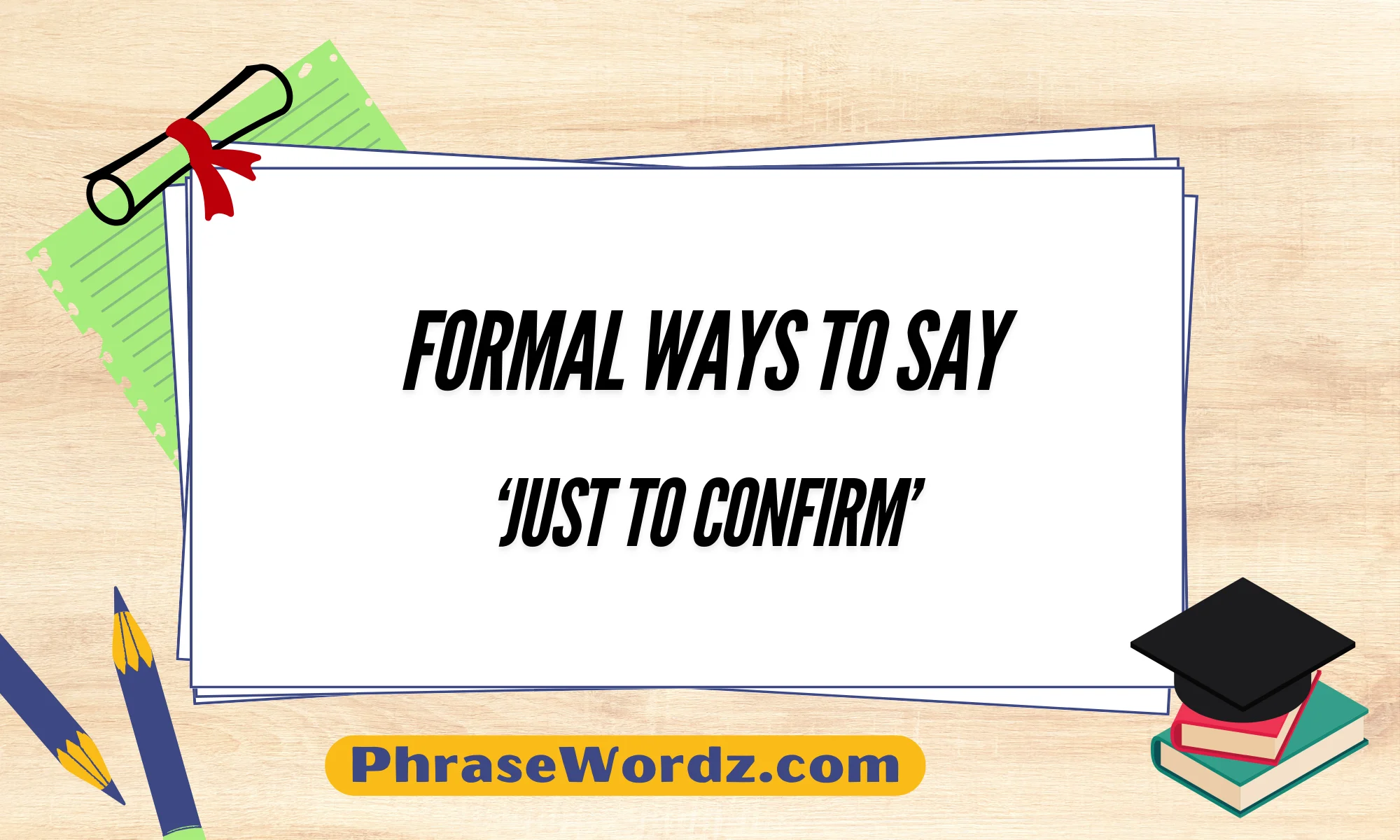In professional communication, it’s essential to be clear, polite, and formal when clarifying details, making confirmations, or seeking verification. “Just to confirm” is a common phrase used in business emails and discussions, but using it repeatedly can come across as repetitive. Diversifying your language not only improves clarity but also demonstrates professionalism and versatility. Below are 20 formal ways to say “Just to confirm,” with scenario examples for each to guide you in various contexts.
Seeking formal alternatives to “Just to confirm”? Use expressions like “For your confirmation,” “To clarify,” or “To reconfirm” to ensure clear, polished communication. These phrases help convey attentiveness while adding a professional tone to your messages.
List Of Formal Ways to Say ‘Just to Confirm’
- I Would Like to Verify
- Please Confirm That
- Could You Kindly Confirm
- I Am Writing to Confirm
- Kindly Verify
- Please Let Me Know If
- May I Confirm
- I Would Appreciate Confirmation Of
- To Ensure Clarity
- I Would Like to Confirm
- Please Acknowledge Receipt
- Could You Please Confirm Receipt Of
- Please Provide Confirmation Regarding
- I Am Seeking Confirmation Of
- To Confirm Our Understanding
- I Would Be Grateful If You Could Confirm
- Could You Please Verify
- I Would Like to Ensure
- I Am Reaching Out to Confirm
- I Am Following Up to Ensure
1. I Would Like to Verify
This phrase conveys a formal request for confirmation, ensuring clarity before proceeding with further action.
Scenario Example (Work Email)
Subject: Verifying Meeting Details for Tomorrow
Dear Mia,
I hope this email finds you well. I would like to verify the details of our scheduled meeting for tomorrow. As per our previous conversation, the meeting will take place at 10:00 AM in the conference room on the third floor. Additionally, I believe we will be discussing the Q3 performance review and the new project initiatives.
Please let me know if all the above information is correct, or if there are any changes.
Best regards,
Hannah
2. Please Confirm That
This direct phrase is useful when seeking assurance about specific details in a concise manner.
Scenario Example (Logistics Email)
Subject: Delivery Date Confirmation
Dear Mia,
I hope you’re doing well. Please confirm that the shipment of the new inventory is still on schedule for delivery this Friday, September 22nd. We are preparing the necessary resources on our end, and it would be helpful to have an accurate timeframe.
Thank you for your assistance.
Best regards,
Hannah
3. Could You Kindly Confirm
Using “kindly” adds an extra layer of politeness, making it appropriate for formal communications.
Scenario Example (Travel Arrangements Email)
Subject: Flight and Hotel Booking Confirmation
Dear Mia,
I trust this email finds you well. Could you kindly confirm the details of my flight and hotel booking for the upcoming business trip to London? I believe the departure date is Monday, October 2nd, with a return on Friday, October 6th, and accommodation at the Hilton Paddington Hotel.
Please let me know if all the arrangements are accurate.
Thank you in advance.
Best regards,
Hannah
4. I Am Writing to Confirm
This phrase is ideal for initiating an email where the purpose is solely to confirm details that have already been discussed.
Scenario Example (Team Meeting Email)
Subject: Confirmation of Team Meeting
Dear Mia,
I am writing to confirm our scheduled team meeting on Monday, September 25th, at 9:30 AM in the main conference room. We will be discussing the progress of our current project and allocating tasks for the upcoming deadlines.
If there are any changes to the meeting time or agenda, kindly inform me as soon as possible.
Best regards,
Hannah
5. Kindly Verify
A concise and polite way to request verification of specific details, often used in formal settings.
Scenario Example (Invoice Verification Email)
Subject: Invoice #3421 Verification
Dear Mia,
I hope you are doing well. Kindly verify that the attached invoice #3421 reflects the correct amount for the services provided in August. If there are any discrepancies, please feel free to reach out so we can address them promptly.
Thank you for your attention to this matter.
Best regards,
Hannah
6. Please Let Me Know If
This phrase allows the recipient to confirm or correct details in a more flexible and open-ended way.
Scenario Example (Project Deadline Clarification)
Subject: Clarification on Project Deadlines
Dear Mia,
I wanted to touch base regarding the project deadlines we discussed last week. Please let me know if the revised deadline of October 15th for the final draft is still feasible for you. We want to ensure that all departments have ample time to review and provide feedback.
Looking forward to your response.
Best regards,
Hannah
7. May I Confirm
This phrase politely asks for confirmation, especially in more formal or cautious situations.
Scenario Example (Formal Event Coordination)
Subject: Event Date Confirmation
Dear Mia,
I hope this message finds you well. May I confirm that the company gala event is still set to take place on November 10th, 2024, at 7:00 PM? We are in the process of finalizing the invitations and would appreciate your confirmation.
Thank you for your time and assistance.
Best regards,
Hannah
8. I Would Appreciate Confirmation Of
This phrase is slightly more formal and emphasizes that you are awaiting a confirmation.
Scenario Example (Contract Review Email)
Subject: Contract Agreement Confirmation
Dear Mia,
I hope you are well. I would appreciate confirmation of the final contract terms we discussed last Friday. Specifically, I’d like to ensure that the agreed-upon payment schedule and delivery timeline are reflected accurately in the document.
Please confirm at your earliest convenience.
Best regards,
Hannah
9. To Ensure Clarity
This phrase adds a layer of professionalism by emphasizing the need for understanding and precision.
Scenario Example (Product Delivery Email)
Subject: Clarification of Delivery Address
Dear Mia,
To ensure clarity, could you please confirm the delivery address for the package scheduled to be sent out tomorrow? I have the following on file: 1234 Park Avenue, Suite 500, but I want to make sure there have been no recent updates.
Your confirmation would be greatly appreciated.
Best regards,
Hannah
10. I Would Like to Confirm
This phrase is a straightforward way to clarify details, suitable for both internal and external communications.
Scenario Example (Client Email)
Subject: Confirmation of Meeting Agenda
Dear Mia,
I would like to confirm the agenda for our meeting on Tuesday, September 26th. Based on our last conversation, we will be covering the Q4 sales strategy, the new product launch, and any outstanding client concerns.
Please confirm if this aligns with your understanding.
Thank you,
Hannah
11. Please Acknowledge Receipt
This phrase is especially useful when you need the recipient to confirm that they have received your message or document.
Scenario Example (Document Submission Email)
Subject: Submission of Quarterly Reports
Dear Mia,
I hope this email finds you well. Attached, you will find the quarterly reports for review. Please acknowledge receipt of these documents, and let me know if you need any further information or clarification.
Thank you for your time.
Best regards,
Hannah
12. Could You Please Confirm Receipt Of
Similar to the previous phrase, this variation politely asks the recipient to confirm that they have received the information or item.
Scenario Example (Shipment Confirmation Email)
Subject: Shipment Confirmation Request
Dear Mia,
I trust you are doing well. I am writing to ensure that the shipment of goods sent last week has arrived safely. Could you please confirm receipt of the package, and let me know if everything was in order upon delivery?
Thank you for your assistance.
Best regards,
Hannah
13. Please Provide Confirmation Regarding
This phrase is ideal when you need confirmation about specific aspects of a matter or issue.
Scenario Example (Project Details Clarification Email)
Subject: Project Milestone Confirmation
Dear Mia,
I hope this email finds you well. Please provide confirmation regarding the completion of the second milestone in the project. We are aiming to move forward with the next phase and would appreciate an update on its current status.
Thank you in advance for your response.
Best regards,
Hannah
14. I Am Seeking Confirmation Of
This phrase is more formal and suggests a polite request for clarity on a specific detail or action.
Scenario Example (Budget Meeting Email)
Subject: Confirmation of Budget Review Meeting
Dear Mia,
I trust this message finds you well. I am seeking confirmation of the budget review meeting scheduled for next Thursday, September 28th, at 2:00 PM. We plan to finalize the allocations for Q4, and your confirmation would help us prepare accordingly.
Thank you for your assistance.
Best regards,
Hannah
15. To Confirm Our Understanding
This phrase is helpful when you want to ensure that both parties are on the same page regarding a previous discussion.
Scenario Example (Conference Call Follow-up Email)
Subject: Confirming Our Understanding of Next Steps
Dear Mia,
Following our conference call earlier today, I wanted to confirm our understanding of the next steps. As discussed, I will prepare the initial draft by next Monday, and you will review it by Wednesday. We will then schedule a follow-up meeting to finalize the document.
Please confirm if this aligns with your expectations.
Best regards,
Hannah
16. I Would Be Grateful If You Could Confirm
A more formal and polite variation, often used in high-level communications.
Scenario Example (Policy Agreement Email)
Subject: Policy Review Confirmation
Dear Mia,
I trust you are well. I would be grateful if you could confirm whether the new company policy regarding remote work has been finalized. We are eager to communicate these changes to the team, and your confirmation would be greatly appreciated.
Thank you for your time.
Best regards,
Hannah
17. Could You Please Verify
This is a polite, direct request for verification, often used when dealing with important details.
Scenario Example (Work Schedule Confirmation Email)
Subject: Work Schedule for Next Week
Dear Mia,
I hope this email finds you well. Could you please verify that the updated work schedule for next week has been finalized? I want to ensure that I am available for the key meetings and deadlines.
Thank you for your time and consideration.
Best regards,
Hannah
18. I Would Like to Ensure
This phrase indicates that you want to be absolutely certain of the details before moving forward.
Scenario Example (Project Submission Clarification Email)
Subject: Ensuring Submission of Final Project
Dear Mia,
I hope this message finds you well. I would like to ensure that the final project report I submitted yesterday was received and that all the necessary documents are included. If anything is missing, please let me know so I can address it promptly.
Thank you for your attention to this matter.
Best regards,
Hannah
19. I Am Reaching Out to Confirm
This phrase implies that you are following up on a matter to ensure everything is in order.
Scenario Example (Training Session Email)
Subject: Confirmation of Training Session Details
Dear Mia,
I am reaching out to confirm the details of the upcoming training session scheduled for next Friday, October 6th. As per our previous discussion, the session will start at 9:00 AM and cover the new software implementation.
Please confirm that the date and time are still correct.
Thank you in advance.
Best regards,
Hannah
20. I Am Following Up to Ensure
This phrase is especially helpful when following up on a matter that requires confirmation or attention.
Scenario Example (Payment Status Follow-up Email)
Subject: Payment Status Follow-up
Dear Mia,
I trust this email finds you well. I am following up to ensure that the payment for invoice #5678, which was due last week, has been processed. If there are any issues or if additional information is required, please let me know.
Thank you for your prompt attention to this matter.
Best regards,
Hannah
Conclusion
There are numerous ways to formally say “Just to confirm” that are suitable for a range of professional situations. Using these variations not only improves the flow of communication but also demonstrates respect and professionalism in your interactions.











